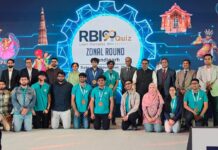Chandigarh April 18, 2023
A ‘Dissemination cum Consultation Workshop’ titled “Crop Residue Management for Sustainable Agriculture” organized by the Centre for Human Rights and Duties, Panjab University in collaboration with the Department of Agriculture and Farmers Welfare, Haryana. The core focus of this project centered around a study titled “Impact Assessment Study of Crop Residue Management Scheme in Haryana” and was sanctioned by the Department of Agriculture, Haryana toProfessor (Dr.) Namita Gupta, Centre for Human Rights and Duties, Panjab University as principal investigator of the project.
Inaugural Session
Prof. Harsh Nayyar, Director, Research and Development Cell, Panjab University, Chandigarhin his opening remarks said that Stubble Burning is an extremely vital issue which needs a lot of attention in Punjab and Haryana. This has a major impact on the environment, climate change and soil health. Various technologies have been introduced by Indian Agriculture Institutes and IITs despite that this issue is still prevalent because of lack of awareness, and expensive technology etc.
Professor (Dr.) Namita Gupta (Principle Investigator),Centre for Human Rights and Duties briefed that the survey was carried out in 13 districts in Haryana covering 151 villages and 3020 farmers. The study found that farmers primarily used ex-situ management is mostly used by farmers. She further shared various challenges in the field.
Shri Gurmeet Singh Meet Hayer, Hon’ble Minister of Science, Technology and Environment, Government of Punjab while sharing the ground experience stated that the Stubble burning is a major issue in Northern India despite a lot of awareness among farmers. There are five places in Punjab where Parali has not been burned in the past 15 years. These farmers were honored by the Punjab government in order to increase awareness of such practices because stubble burning also led to loss of insects and jeevjantu life. It is a collective responsibility of all the stakeholders like farmers, government, NGOs, industries, and common citizens to reduce pollution. Current Punjab government is also making great efforts in this regard. The major achievement is that no city of Punjab comes under the top 10 polluted cities of India. He congratulated the Centre for Human Rights and Duties for initiating this consultation workshop at the time when such consultations can lead to positive impact during the sowing season in the month of October and November. He further encouraged the Centre to conduct such consultations in the various constituent colleges of Punjab in the months to come.
Sh. Harbhajan Singh, Hon’ble Minister of Power and PWD, Government of Punjab said that SDG no 2 aims to end hunger, achieve food security and improved nutrition, and promote sustainable agriculture. The Punjab government is also working in this regard for long term and short-term management. Therefore, stubble burning areas have been reduced in the past few years and agro-based industries have been promoted. Various action plans, state policies and the I-khet App have been introduced to mitigate this problem. He asserted that moreresearch should be done for introducing more innovative practices for stubble management.
Prof. (Dr.) Adarsh Pal Vig, Chairman, Punjab Pollution Control Board in his previous capacity as the Director, Department of Botanical and Environment Sciences, Guru Nanak Dev University, Amritsar spearheaded the University in achieving sustainable development goals. He said that there is a reduction in stubble burning from the previous year in Punjab. In-situ and Ex-situ management managements are two ways to reduce stubble burning.
Dr. K.C Banger,Chairman, State Advisory Committee, Department of Environment and Climate Change, Haryana said that Paddy straw burning is a major cause of the increased level of CO2 in the atmosphere. Agriculture sector is only contributing 6-7% for air pollution while industries and the transportation sector are responsible for 76 % of air pollution. Paddy straw is like a Poplar and Eucalyptus which can be used as a precious material.Compositing of paddy straw is one of the solutions.
Sh. Umendra Dutt, founder member & executive director of KhetiVirasat Mission, Faridkot, Punjab is the trailblazer, when it comes to critical issues on sustainable farming, food safety and seed sovereignty. He has spearheaded the agrargrian, ecological and environment health issues in Punjab. In hisInaugural address, he raised the issues of displaced people who were displaced during the construction of Bhakhra Dam. Agricultural development during the green revolution caused a lot of trouble. We need to think beyond the issue of stubble burning when we discuss the problem of the agricultural sector. Punjab Agriculture University and Niti Ayog should focus on Farmers Suicides cases, as such cases increased after the introduction of agricultural development models. Stubble burning is also a psychological issue because even with the introduction of machinery for the residual management of stubble in district Sangrur, still this district came in top for stubble burning. There is a need to evoke the spirit of mankind in how they see their relation with mother earth. The millets can be introduced only if there are reforms in the agricultural development system.
Shri. Narhari Singh Banger, IAS, Director, Department of Agriculture and Farmer’s Welfare, Haryana and additional charge of Mining and Geology to come and say a few words. Apart from being an impeccable administrator, his sharp acumen and holistic experience with public policy and administration has been instrumental towards the successful fruition of countless developmental plans and collaborative social schemes.
Dr. Upneet Kaur Mangat, Chairperson, Centre for Human Rights and Duties gave formal vote of thanks and said the need of the hour is to check the pollution created by other sectors including industrial units instead of putting all the burden on agriculture and farmers.
The workshop further had two Technical Sessions. Technical session I was on the topic “Crop Residue Management: Strategies and Way Forward”. The panelists for the session were Sh. BhupenderRinwa, SEE, Haryana Pollution Control Board, Government of Haryana; Sh. Lavneet Dubey, SEE, Punjab Pollution Control Board, Government of Punjab; Sh. Jagminder Nain, Joint Director, Department of Agriculture, Haryana; Sh. Manmohan Kalia (Retd.), Joint Director, Department of Agriculture, Punjab; Sh Anubhav Chauhan, GM Power Point, Nachiketa Paper Ltd.
Technical Session II was on “Crop Residue Management: Experiences from the Field”. The panelists for the session were Dr. Vinod Chaudhary,Agriculture Practitioner and Assistant Professor, Department of Sociology, Panjab University, Chandigarh; Sh. Dhananjay Kumar and Sh. Sourabh Saini, Project Director and Assistant Project Director, KVM, Faridkot; Sh. Ajai Malik, IPS Foundation, Delhi; Progressive Farmers from various Districts of Haryana and Punjab: Sh. Harmandeep Singh, Sarpanch, Rode; ShJagtar Singh Sahota; Sh Ramesh Mandiya (Punjab);&ShManbirRadhu; Sh Rishi Raj; ShTriliki Nath and Sh Gurnam Singh (Haryana).
The workshop was attended by faculty members, students, researchers and farmers from Punajb and Haryana as well as by the field officers from various districts of Haryana. The workshop was culminated with a note that more such workshops would be conducted in the coming months in the various districts of Haryana.
















